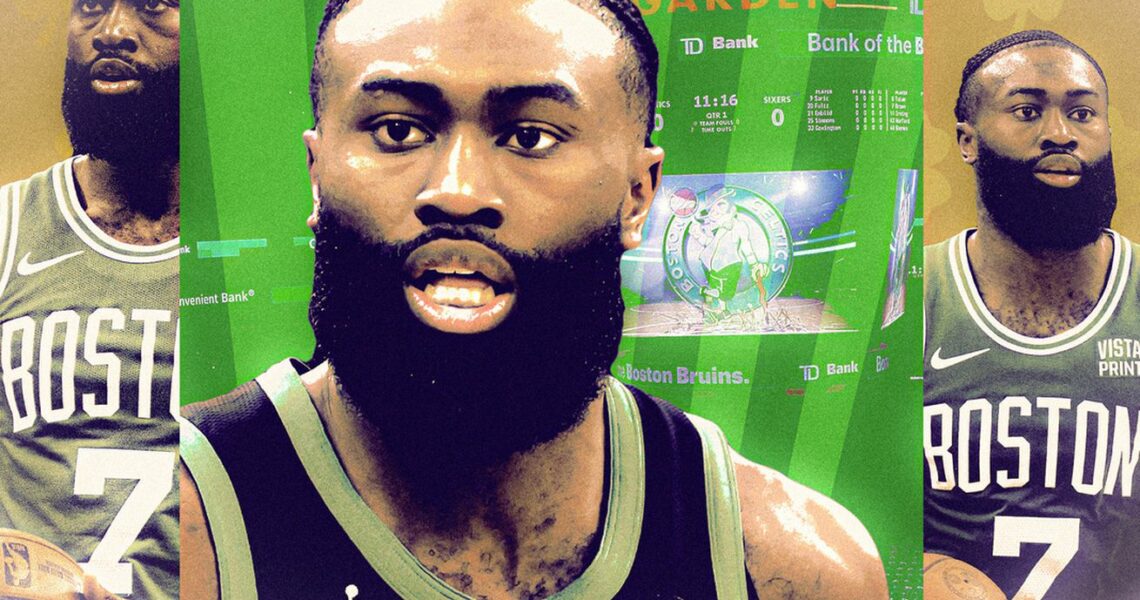
By sharpening his skill set without losing his edge, Brown has turned a long-simmering question into the Celtics’ most reliable force
The Boston Celtics nearly lost Game 3 over the course of eight minutes—all the time it took for the championship favorites to fritter away a 21-point lead in the fourth quarter, allowing the Dallas Mavericks back into a game and a series that should have been effectively over. And perhaps the Celtics would have lost Game 3, but for the resolve of Jaylen Brown. During those eight minutes, Brown was the only Celtic to score. First, after Dallas surged to a 12-0 run, he sealed Luka Doncic in the post and canned a Doncic-esque fadeaway over the top of him. Then, following another 10-0 Mavericks run, Brown patiently waited out a Jayson Tatum drive so that he might swoop in for a putback off his costar’s miss.
Both baskets were, on their face, unremarkable. Yet they were all that Boston could do to stem the tide at a point in the game when all the momentum had shifted in Dallas’s favor. “Big time,” Derrick White said. “Big-time shots.” It was in keeping with a trend: When the Celtics do fall out of sorts, it’s usually Brown who offers the most powerful correction. A committed drive to answer a run. A huge stop that changes everything. “I felt like I’ve been able to deliver just by being patient and being poised,” Brown said. But it’s more than poise; Brown is playing the best, most mature basketball of his career. It’s why he now finds himself a win away from the title and, most likely, winning Finals MVP. No other perimeter star has played more stifling defense throughout these playoffs—save for maybe Tatum. Few have attacked so fiercely and consistently, even in pressurized moments when all the team’s concepts have ground to a halt.
JAYLEN BROWN. MONSTER SLAM.
He finished the 3Q with 15 PTS!
Celtics looking to go up 3-0 headed to the 4th on ABC pic.twitter.com/qBuzzhPkpR
— NBA (@NBA) June 13, 2024
No matter what Jason Kidd would tell you, his suggestion that Brown is, in fact, the best player on the Celtics was a transparent bit of gamesmanship—naked enough in its intentions to draw knowing glances from the attending media and tactful dismissals from all the other Celtics asked for comment. “J-Kidd, man,” Al Horford said. “I see what he’s doing.” It also hasn’t worked; Tatum didn’t try to take over the series to prove Kidd wrong, Brown didn’t dial up his game to prove him right, and the Celtics on the whole have controlled these NBA Finals through patient, coordinated team basketball.
Yet part of the reason that Kidd (or any opposing coach) would even try to lob that particular grenade into the Celtics locker room is that, on many nights, Brown is at least close enough to being Boston’s best player to start some conversation—or, rather, stoke a long-burbling conversation that has been had to death, in all its possible forms, with so much great basketball reduced to fake trade scenarios and projections of ego.
For two similarly sized forwards charting a course as teammates, every failure has invited thorough examination. And Brown and Tatum have failed plenty, often by falling just short—of the Finals, time and time again, and eventually of the title, after finally breaking through to the championship series in 2022. “Experience,” Brown said, “is the best teacher.” When the Celtics lost, it wasn’t just Tatum and Brown that came under fire, but the very concept of their partnership. It wasn’t always this smooth. Over the years, both had to learn how to play like stars without recentering the offense on themselves. And even when they did, they managed to inspire chatter over whether, given all their talents, they might be better off apart.
What that conversation usually missed (and what made Kidd’s comments so easy to swat away) is that it serves Boston’s interests when Brown plays like the best Celtic on the floor. Tatum is an immensely talented and versatile player with an adaptability to his game that has allowed Boston to make five conference finals runs in his seven seasons. He’s also the kind of superstar who needs a peer—whose game invites a costar like Brown to take the wheel.
Brown does so with confidence and force, filling a vital, counterbalancing role in the offense, which can usually generate an open 3 anytime it wants. Tatum initiates so much of their offensive action and has notably been the only threat on the floor to consistently draw Maverick double-teams in this series. Kidd may say one thing from the podium, but his tactical choices say another—daring Tatum to make challenging crosscourt reads and effectively baiting Brown to attack in the hopes that it might narrow an otherwise varied Celtics offense. Brown has instead responded with balance, taking the drive when it’s there and advancing the possession through other means when it’s not.
“I mean, how can I explain Jaylen?” Joe Mazzulla asked himself after Game 3. “The guy just has a growth mindset. He just wants to get better. He yearns to get better.”
Brown has never been the most natural playmaker, but over the years he’s broadened his field of vision and deepened his understanding of what’s required. Attacking a mismatch is sometimes just a means to an end; Brown is blowing past defenders with an opportunistic poise in these Finals and throwing more passes against Dallas than against any of Boston’s other playoff opponents. Why settle for straight-line drives, after all, when one of the most dynamic players on the floor can force the Mavericks into more far-reaching compromises? “I think Joe always challenges, in particular, me and J.B. to find different ways to affect the game,” Tatum said. Such is the burden of stardom. There will be matchups or circumstances that make life difficult on Tatum or Brown or both. Yet between them, the two forwards find ways to shape every game in the Celtics’ image. To make the pace of the game their pace. To manipulate the floor to put the defense into their spacing.
“The pressure that they have on themselves to execute and to be great is a little bit different than my pressure,” Jrue Holiday said. Holiday has the luxury of slinking behind a defense keyed in on Tatum and Brown. Kristaps Porzingis—when healthy—gets to punish the mismatches that his two star teammates help create. Almost 90 percent of Horford’s shots are assisted—often through actions that Boston’s forwards initiated. The Celtics may look and feel like a superteam at times, and their overall talent is undeniable. Yet almost everything that Boston is and does comes back to Tatum and Brown, in almost equal measure.
That is not an indictment of Tatum. It’s a statement of fact, reflective of how much Boston has come to depend on Brown in an unsteady moment. “That’s the majority of what the battle is, just managing your emotions,” Brown said. “How do you handle adversity and your will and your perseverance?” There is a boldness to Brown that spurred on all those debates in the first place—a boldness that Kidd tried to goad, with tactics that honestly feel a few years out of date.
All season long, opponents have challenged Brown and failed. They’ve challenged his skill, daring him to shoot from deep. They’ve sent extra bodies his way, challenging his judgment and his court vision. They’ve tried to live with switches that advantaged Brown but might take Boston out of its flow—challenging, among other things, his pride and restraint. Brown never really lost sight of the bigger picture. He isn’t perfect, and hasn’t been in these Finals. Yet as Boston’s other star—and maybe, on some nights, its best player—he has grown into this moment. You can see it in his evolving skill set, but even more in his focus. There is a clarity to the way Brown operates now, sharpened without losing the edge that makes him such a ferocious competitor in the first place.
“I like to pride myself that I always try to play with that fire and that passion,” Brown said. “I feel like that’s what makes me who I am: the essence of why I play and how I play. But my experiences—the heartbreaks, the losses—have all kind of cultivated into what you see now.”
After eight seasons in the league and now seven playoff runs, Brown has seen too much to be pulled out of himself, least of all by a smirking nudge of the team’s natural order. There’s too much at stake. Brown has been close to a title before, when the Celtics took a 2-1 lead against the Warriors in the 2022 Finals. “We’ve grown from that,” Brown said. “We really have.” That series slipped away when Boston lost sight of itself—ceding ground not just to the shotmaking of Steph Curry, but also to the certainty in Golden State’s entire way of life. Champions know who they are. This time around, the Celtics do, too.

